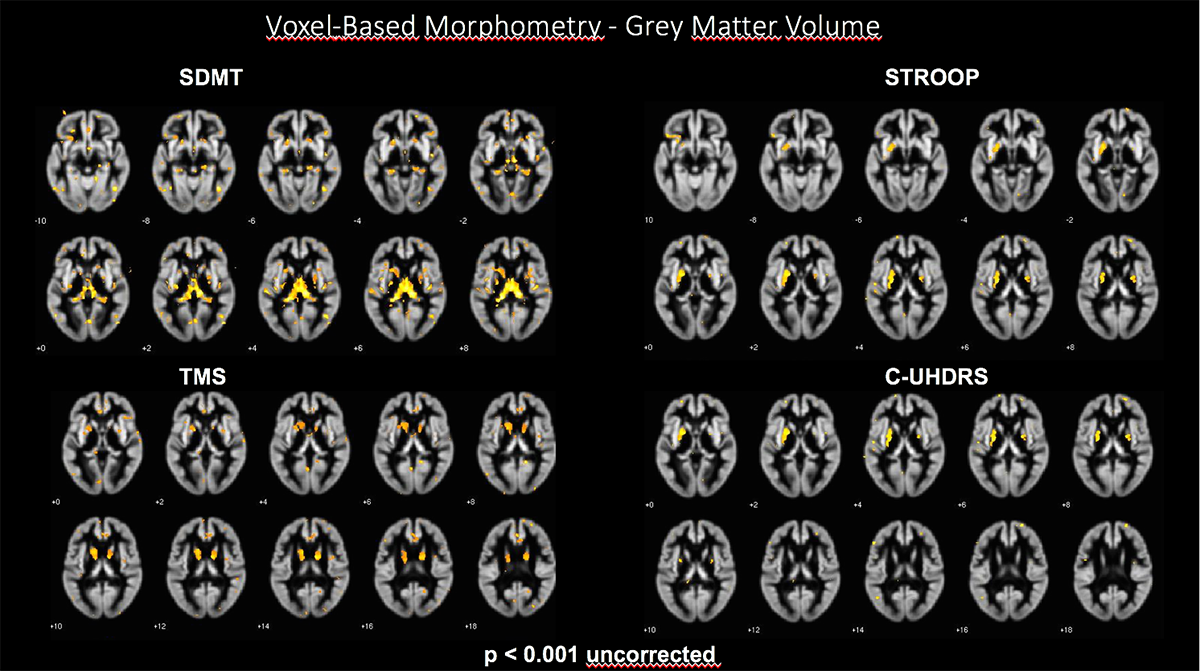Session Information
Date: Monday, September 23, 2019
Session Title: Huntington’s Disease
Session Time: 1:45pm-3:15pm
Location: Agora 3 West, Level 3
Objective: Scores on the symbol digit modalities test (SDMT), Stroop word-reading, Total Motor Score (TMS) and composite UHDRS (cUHDRS) are correlated with disease progression and brain changes in large samples of patients with Huntington’s disease (HD) [1].
Background: Participants were recruited from the PADDINGTON [2] study and comprised 49 early HD patients from 4 different sites . Statistical analysis was performed using Stata version 12.0. The boundary-shift integral (BSI) was used to calculate change over 15 months in whole brain, caudate and ventricular volumes. Baseline grey matter (GM), white matter (WM), whole-brain (WB) volumes and voxel-based morphometry (VBM) analysis were performed using SPM12. VBM results were considered significant at p<0.001.
Method: Ventricular BSI correlated with SDMT (p=0.038), Stroop (p=0.005), TMS (p=0.026) and cUHDRS (p=0.006). GM volume showed statistically significant correlations with SDMT (p<0.001), Stroop (p=0.03), TMS (p=0.001) and cUHDRS (p=0.045). WB volume correlated with SDMT (p<0.001), Stroop (p=0.045), TMS (p=0.02). Brain BSI showed correlations with Stroop (p=0.03) and cUHDRS (p=0.03)[RG1] , all results shown at an uncorrected level. VBM showed correlations between baseline GM volumes of several different subcortical nuclei with all clinical measures. (shown below in Image 1)
Results: There were statistically significant associations between clinical measures and change over time in brain volumes, suggesting that clinical decline is closely linked to ongoing pathology in HD.
Conclusion: There were statistically significant associations between clinical measures and change over time in brain volumes, suggesting that clinical decline is closely linked to ongoing pathology in HD.
References: [1] Tabrizi SJ, Langbehn DR, Leavitt BR, Roos RAC, Durr A, Craufurd D, et al. Biological and clinical manifestations of Huntington’s disease in the longitudinal TRACK-HD study: cross-sectional analysis of baseline data. Lancet Neurol [Internet]. 2009;8(9):791–801 [2] Hobbs NZ, Cole JH, Farmer RE, Rees EM, Crawford HE, Malone IB, et al. Evaluation of multi-modal, multi-site neuroimaging measures in Huntington’s disease: Baseline results from the PADDINGTON study. NeuroImage Clin 2013;2(1):204–11.
To cite this abstract in AMA style:
C. Estevez Fraga, E. Johnson, F. Rodrigues, P. Zeun, N. Hobbs, E. Rees, R. Roos, B. Landwehrmeyer, A. Durr, S. Gregory, R. Scahill, G. Rees, S. Tabrizi. Correlation between structural neuroimaging and clinical outcomes in a small sample of patients with early Huntington’s disease [abstract]. Mov Disord. 2019; 34 (suppl 2). https://www.mdsabstracts.org/abstract/correlation-between-structural-neuroimaging-and-clinical-outcomes-in-a-small-sample-of-patients-with-early-huntingtons-disease/. Accessed July 15, 2025.« Back to 2019 International Congress
MDS Abstracts - https://www.mdsabstracts.org/abstract/correlation-between-structural-neuroimaging-and-clinical-outcomes-in-a-small-sample-of-patients-with-early-huntingtons-disease/

